|
40 Whoever welcomes you welcomes me, and whoever welcomes me welcomes the one who sent me. 41 Whoever welcomes a prophet in the name of the prophet will receive a prophet’s reward; and whoever welcomes a righteous person in the name of a righteous person will receive the reward of a righteous person 42 and whoever gives even a cup of cold water to one of these little ones in the name of a disciple- truly I tell you, none of these will lose their reward. Hello Southside, I want to start by saying thank you, for giving me this time to share and to be here with you all this Sunday, on Immigration Sunday. I am excited to share with you my reflections and how I am feeling about this idea of “welcoming others”, no matter who they are. “Welcome the stranger”, “treat others the way you want to be treated”, “love thy neighbor” These are all phrases that I have heard since I was little. To me, I feel they are the backbone of church and ministry. Yet, these last few years, they sound like hypocrisy. How many exceptions do we make to what stranger we accept, what neighbor deserves our love, or who we should treat well? These are the thoughts that have consumed my YAV year and made me question my place in the world and where my vocation will take me. Serving as a YAV, one of the hardest lessons I have had to learn AND constantly be reminded of this year, is that as a YAV I am wanted but not needed. I am a stranger and a tourist in this place. I am welcomed and accepted but not necessary. I am loved, but this is not my home. My year in Tucson has taught me so much and made me reflect a lot on what home is and what it means to be comfortable somewhere. As opposed to other places I have lived and been to, Tucson has made me think about what it means for a culture to welcome someone and what it looks like when that person is different from me or different from the community around me. As many of us know, the church has a complicated past with mission work. We as YAV’s have lots of quotes from our year written on paper in the walls of our house. One of them reads: White saviorism, like colonialism, assumes that Black Indigenous People of Color need white people to save them. Without white intervention, instruction, and guidance, Black Indigenous people of color will be left helpless. That without whiteness, the BIPOC community who are seen as below and less than white in the white imagination, will not survive. It puts BIPOC in the position of helpless children who need to be saved by the supposedly more capable and wiser white people”. This quote was shared with us during our Delegation to the border by AmyBeth Willis, the original quote is from Layla Saad. To me, this quote is the embodiment of how the church started and sometimes continues to enact mission. We as people of God get excited about taking a vacation somewhere and “making our souls feel happy” by serving those we see as the “less fortunate”. We spend a week fixing something then, leave no direction on how to sustain our work when we leave because it is expected that other “saviors” will be back for their vacation and to fix the problem again. When I read the scripture for this week. I was consumed by this idea. I first felt guilty over being welcomed, then I felt uncomfortable with how “rewards” were included in the work of the Lord. Do we as God’s people only do work for a reward? What is with this hierarchical system? Welcome the prophet, receive the prophets reward, welcome the righteous, receive the same, give EVEN a cup of water to “the littlest of these– meaning the poorest…. And surely you will receive some kind of reward. Time after time… this is how I read the scripture. I was confused and hurt by how even the “word of God” could be so prejudiced. When Alison asked if I wanted to change scripture passages, I was close to doing so. But, scripture isn’t meant to come easy. It is meant to be struggled with. This is a text that recorded and upheld the values of a culture from the dawn of time. And just like my YAV year, it is meant to push and grow into something more. So, bear with me as we all do like YAV’s do best and “lean into the discomfort” I came to Tucson fully aware of this stereotype of the “white savior” and it was eerie to me, how much easier fundraising was when I said I was going to the US/ Mexico border instead of when I went to the “brewing capital of the world” last year to study poverty. Even with the backlash of helping “illegals” enter and “steal our jobs”, my fundraising went much better. It seemed like less of a “vacation” and more “charity”. Therefore, even more uncomfortable. I can’t help but assume that this mindset is partially due to the fact that I am a young white woman who has come to “do God’s work”. I can’t help but feel guilt over how welcome I am. Guilt because my whole year here has been studying and observing the ways we as a system, a government, and as a people, refuse to accept the people both native and needing of this land as refugees. How can we tell a person that has been here “as long as the deeply rooted mesquite tree” that we have no space for them or that our American government controls their ancestral land? How can we as a collective people, continuously allow for people to die in the desert and shoot holes in both their bodies and water jugs when all they are after is a free life away from violence, harm, and war. Or, maybe they just want to reunite with their families. How can our government tell people that have been here for 30 years, never convicted of a crime, and profiled while driving, that they don’t belong? How can we as citizens continue to respect and uphold the systems that uphold this hatred? I believe it is because we refuse to see it. We don’t believe it. We make EXCUSES for it. It does not affect those in power, so why pay attention? My year with Keep Tucson Together has shown me time and time again how complex our immigration system is. Laws and policies are continuously written to manipulate justice. I have heard many of our volunteer attorneys and long time volunteers share the ways in which this system is confusing to THEM. These are BRAINIACS with degrees and years of research to fall back on. If they have trouble understanding all the logistics, how do we even begin to think that a person could go through our immigration system alone? Last year, 22,677 cases of individuals, families, and children, went through the Tucson Immigration court system. Of those cases, 98% went without a lawyer. 18,059 of our neighbors, families, and individuals fleeing violence went into court unaccompanied. My work with Keep Tucson Together this year has shown me that cases that are “won” by the court are few and far between. Even WITH representation, it is hard to “win” over the government and convince the judge that these cases are more than a file, that these individuals are more than their assigned “alien identification number”. Our government makes the hoops one has to jump through for naturalization and citizenship impossible. Even in doing the process correctly, you are criminalized and punished. The first time I heard that folks pleading asylum are often not eligible for bond I was outraged. These are people that have followed our systems “rule” came “legally” through the Port of entry instead of “sneaking in” and are then often obtained by ICE and given a record. They are then branded with the term alien and are ineligible for bond therefore are trapped in the death camps we have created during this pandemic- I mean—- they are held in respective detention centers. The process of dehumanization around immigration is strong, we know we are doing wrong by NOT welcoming the stranger. We KNOW that these strangers have every right to be here and are our neighbors, friends, and siblings in Christ. However, we let fear drive us to hatred and we accomplish this by not seeing the human inside the individual. Instead, these people are given nasty labels like “illegals” “aliens” “drug lords” and “thieves”. We refuse to think of them in truth, as the neighbors, victims, and PEOPLE that are here. Because that would mean we were wrong and our government lies and our world is broken. That would mean I as a white person would have to change my lifestyle. I as a white person would then become overwhelmed and shut down, instead of adjusting to the change. If we were to really stop, and think about things…. Who are “Americans” to stand on stolen soil and tell a person they are not welcome? When did this stolen soil become “ours” to dictate and manage? How can “we” tell a refugee, there is no room for you here and you cannot come in? When that is LITERALLY how 75% of Americans came here? As Christians, we are given one task- to love your neighbor. If Tucson, a city of half a million people has taught me any more lessons, it’s that even in a city this big, you know everyone through one degree of connection. We are all neighbors, we are all siblings in Christ. We are all commanded to love one another. Southside knows these issues better than anyone, this stereotype of the church, of saviorism, and of the harm we as an organized religious body have done. Y’all, more than any other church that I have seen, are a church that has strived to revert its witness and reconnect with the roots of this land and its culture. Every service holds the culture of Tucson in its heart. Every time we listen to the blessing in the O’Odham language or hear the word of God brought to us in Spanish, we are rebelling against the systems and rejecting the social norm of “whiteness” that is mistaken for “civilized”. WE are holding space for visitors to feel welcome. Visitors of all kinds, not just the young white female before you. Honored, as I am to be here. Every time my site coordinator introduces herself to a group, she says that she lives in the unceded land of the Tohono O’odham that is now named Tucson. I am in awe with the way she says it every time she says it because it takes me back to the stories I have heard from Guadalupe Castillo this year, it reminds me of the hike I went on with you all to Baboquivari, the fear of getting stuck in the “birth canal”. It reminds me of the culture and the ancestors that inhabited this place. I reflect on the ways that I have been welcomed into this desert land with open arms, from a group of people that should have every reason to push me away. Yet, they didn’t. I have received true hospitality in Tucson. And it makes me uncomfortable. Uncomfortable because everything in my education would say that scripture is referring to “the little ones” as the community I have strived to be a part of. When really, as I saw Mayra in the Christmas pageant or was led by Gil through the spiritual journey at Baboquivari, I was welcomed by the prophets. I have been the one that was given a cold cup of water. While my community, the government I thought I was a part of, is blowing up water jugs in the desert and denying even a lukewarm drink after a perilous journey to the prophets that deserve it most. These are the people of God because just as Jesus, they know what it means to be an outcast and unwelcomed. I know most of you already understand and know of the issues I was just introduced to and have begun grasping this year. Issues of hatred and division. I appreciate the way you have taught me, been patient with me, and called me into La Lucha. Still, I wonder if there are takeaways in my reflection that could be beneficial to you. In closing, I wonder what kind of reflection you can do over the word hospitality? Do you welcome others the way Jesus would do, with open arms and the best intentions? Or, do you hold fear and resentment at times? Do you roll up the windows when driving past Santa Rita park, or do you roll them down and say hello to your neighbors? Do you speak to the whole room when you speak to people or just the ones you are comfortable with? Is there a way to help the 98% of asylum seekers and neighbors that stood alone last year in court? Can you afford to even offer a cup of cold, to a traveler passing by? What makes you comfortable, and what discomfort should you try leaning more into? These are the questions we should think about. And I can’t think of a better time to have immigration Sunday, the day after some have celebrated America’s birthday. A time where we can reflect on not just the current migrant and the ways we are dismissive of them. But, of all the immigrants that have come before them and built the country that we pledge allegiance to. Few, belong on this land, the unceded Tohono O’odham land. Yet, we have claimed it and decided who comes in and who is welcomed. It’s time to reimagine our “welcome” and to see that as Christians and people, we are connected and we are meant to travel, to learn, and grow. And to be together, as equals. link to the whole service To the God of all creatures big and small, we strive to welcome the visitor, whether we are comfortable with them or not, whether they look like us or not, whether they think like us- or not. Whether our visitor be a prophet, of righteousness, or a little one in need of a cool drink, we strive to welcome them, as you have done for us. God of love, help us share your love and spread it- through our hearts, our minds, our feet, and our hands- the ones that serve you.
Amen.
0 Comments
Blessed are the merciful, for they will be shown mercy Mathew 5: 7-12 Who is the person that needs my mercy? Who needs your mercy? When you live in a community of angry and revenge, you learned to be aggressive with every people. But if you have mercy in that world, you will be or looks stranger. It that is a Jesus responds Firstable I want to see with you, how God was mercy for us, and He still give us every day. “He is great in mercy” One of the things about of God`s personality is mercy and we are creative in the divine imagine of God`s love. Second, in this point is really difficult to do and sometimes we just want to jump this part. Be mery with the people who bother you.Remember God all the time every day, every second, has mercy for you. I see the injustice in my community and we say is “the system`s fault”, but the people (us), we are encharge of that system. We can change those laws. I need to be mercy and teach to the kids what is the real thing, what is important, that`s my job. And also, I need to show them, how do mercy, how make mercy.It`s hard, very hard. 26 years living in the border, and my question was why I need to learn English, if they do not want me there? They built that wall, to keep me out. But God gave to me this day is a opportunity to do something. And last one, give mercy make you happy. When you heard the stories and you see how close do you are with that person, you understand how small is this world, and you feel that you are part of the stories. The stories of your brothers, sisters, mothers, fathers, sons… your family.You are part of that family. In there, is when you found the joy, doing mercy with your family (world). Jesus said: Rejoice and be glad because great is your reward in heaven. Spend the eternity with God how wonderful life. It is a promise. I learned if I want to be happy, I need to make mercy and have compassion with all. It is difficult but not impossible. But because of this great love for us, who is rich in MERCY make us alive with Christ, even when we were dead in transgressions: ¡it is by grace you have been saved! Ephesians 2: 4-5 Amen. Dichosos los compasivos porque serán tratados con compasión.
Mateo 5:7 y 12 ¿Quién es la persona que necesita mi misericordia? ¿Quién necesita tu misericordia? Cuando estas en una comunidad en donde el odio y la venganza es una respuesta a la ofensa; molestar misericordia es algo extraño, pero es la respuesta dada por Jesucristo. El primer punto que quisiera decir es Dios mostro y nos dio misericordia y aun lo sigue haciendo “Grande en misericordia” Es pate de ser creado por Dios, la misericordia. Segundo se misericordioso con la gente que muchos veces. Recuerda Dios perdona tus pecados todos los días. Como YAV muchas veces he visto la injusticia alrededor. Y cuántas vidas sufren. Y antes de que me moleste por la situación, recuerdo Dios tiene un plan y yo necesito enfocarme en tener misericordia. No es fácil. No es fácil, por 26 años viviendo en la frontera México/USA pensé si ellos construyeron esa muralla es por qué no me quieren allá, entonces por que tendría que cruzar o aprender su idioma. Es un muro para mantenerme alejada. Pero cada día es una oportunidad. Y tercero dar misericordia te produce alegría. He encontrado tantos buenos momentos cuando escucho las historias y soy parte de ellas, de las cenas o simplemente de tomar una taza de café, tu vida se une. Jesús dijo: Alégrense y llénense de gozo porque los espera una gran recompensa en el cielo. He aprendido que si quieres ser feliz necesito ser una persona que practique la misericordia que agrade a Dios. No la que me parece a mi que es la “misericordia” que tengo que dar. Pero Dios que es grande en misericordia por su gran amor por nosotros. Nos da vida en Cristo, cuando estábamos menos en pecado; ¡por gracia ustedes han sido salvados! Efesios 2: 4-5 Amen. Hi everyone! Last Sunday, we were invited up to Holy Way Presbyterian Church in Tucson to speak some more about our experience as YAVs. This is what I had to say for my sermon:
“For he is our peace, he who made both one and broke down the dividing wall of enmity, through his flesh, abolishing the law with its commandments and legal claims, that he might create in himself one new person in place of the two, thus establishing peace, and might reconcile both with God, in one body, through the cross, putting that enmity to death by it. He came and preached peace to you who were far off and peace to those who were near, for through him we both have access in one Spirit to the Father. So then you are no longer strangers and sojourners, but you are fellow citizens with the holy ones and members of the household of God…” -Ephesians 2: 14-19 Thanks to all of you for inviting us to be present and to speak this morning here at Holy Way. I have been watching and reading much, in the past few weeks and months, about the upcoming Presidential elections. It has been strange to live in Mexico- specifically, on the border- during a time in which there has been so much discourse about so-called “border security” in national media. Most people I’ve met here in the borderlands since my arrival on September 5th are dismayed, even scared, by the possibility of seeing further militarization and deeper division along the border. I, for one, don’t know that our southern border policy currently accomplishes much other than to criminalize the poor who attempt to come to the United States and look for work. During my time as a YAV, I have privately struggled to intellectualize the issue and figure out what would be the ideal way to stem the flow of drugs and organized crime into our country, while allowing law-abiding citizens to pass freely between the United States and Mexico. But I haven’t quite figured that one out yet. Bad on me, I guess. But whatever political opinions we come to on our own, I think it’s important to remember that those who come here are not simply part of a “brown wave,” or looking to “steal jobs from good, hard-working Americans.” They are people, with hopes, aspirations, fears, and dreams, just like you and I. They are people who simply want to escape poverty or violence in their homelands, and feel they have no other choice but to leave. I will tell you now about one of them whom I just met Thursday in the MRC. His name is Javier. We didn’t exchange many words on this particular day. But after he had already eaten with a group of men from the overnight migrant shelter, I simply asked if he would like some of my juice. He declined, and asked instead (very politely) if he could use our telephone to call his girlfriend in El Paso. “Of course,” I told him. She wouldn’t get off work until at least 4 o’clock, however. So Javier settled into the chair in front of where I sat, at the desk in our office, at the back of the MRC. And he waited, and waited some more. After a few moments, he spoke again, and I realized he was tearing up. “Es que quiero buscar a Dios, hermano, pero no sé cómo…” he managed, as a tear dripped from his face. “I want to search for God, brother, but I don’t know how…” I wasn’t sure what to say to that, so I just sat with him and waited patiently, hoping he would tell me more about himself. Javier and I sat in silence a bit longer, then I asked him where he was from, if he had been to the United States, and where his family was. He told me he was from Chihuahua, that he had family back there as well as in San Diego, El Paso, and Denver. He had spent time with his family in all three cities, but was separated from them now. He helped himself to a Kleenex as he was telling me this, and I asked him what he was planning to do next- re-enter the States, or go back to his aunts’ home in Chihuahua. He wasn’t sure, but underscored that he definitely wanted to leave Agua Prieta as soon as he could. I loaned him the phone now, and he called his girlfriend in El Paso. She must not have gotten home from work right on time; the first two times we called, she wasn’t there. After a few more minutes went by, Javier tried again, and she answered. They spoke briefly, while I tried not to listen in, and respect their privacy. When Javier was finished, he hung up, and seemed visibly reassured. He thanked me, and turned to walk out. “Dios está contigo,” I told him, as he walked out, and he thanked me once again. Others I’ve spoken with in the MRC the past couple of days have had to hitch rides all along the Mexican border recently- from Monterrey to Matamoros to Naco and back to Agua Prieta- in order to get where they are now. They are, in the most literal sense, sojourners- strangers in a place strange to them. But we are, of course, fellow citizens of the world. And as Christians, we believe that we are all beloved by God. As we go forth, let’s work to make all with whom we share this earth feel a bit more beloved. Let’s remember Javier. Long time, no blog! I’m back and ready to write! This is a “sermonette” that I given on several speaking events that I attend with my fellow Tucson Borderlands YAVs, Grace, Hanbyeol and Allie. 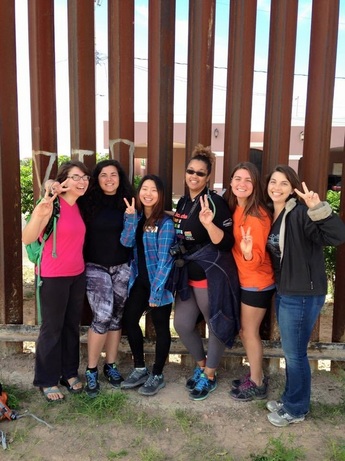 Me, Gaby, Hanbyeol, April, Allie & Grace at the U.S.-Mexico border. We are doing the iconic Korean peace sign that Hanbyeol has taught us to adopt. Gaby spent 3 months in the Hen House as she did her last semester at North Texas doing an externship at a local non-profit, Derechos Humanos. April is a Global Fellow Methodist Volunteer who works at another non-profit called Primavera. Myself, Hanbyeol, Allie and Grace are YAVs. We are collectively from Texas, Maryland, South Korea, San Francisco, Alabama and Connecticut. On the Myer-Briggs spectrum, our community is a motley crew of an ISFP, ENTJ, and INTJs, the list goes on. Some of us rise at 3am and some of us roll out the door 20 or 30 minutes before we have to arrive at work. We have the minds and qualities of poets, delegators, organizers, teachers, life-coaches, mediators, managers, social workers, architects and economists. Yes, there are only six of us in the house but all my housemates are all extremely multi-faceted.
“The Hen House” – as we dubbed ourselves early on in the year- daily face the topics of immigration, sexism in the work place, refugees and asylum seekers, low-income home repair, homelessness, systemic racism. We have read books about charities that hurt more than help. We have discussed the struggles and joys of working alongside non-profits and how the church can better engage young adults and their lifestyles and relevant concerns and how we can better be proactive in our relationship with the church. We not only deal with these realities in our work environment but also process, discuss and unpack these subjects at home. Sometimes we thrive upon this reflection and other times we are so exhausted that we say , “Okay. Let’s talk about something different or let’s go listen to Beyonce and dance.” Don’t worry, sometimes we try to be normal young adults. When my cousin asked me a few weeks ago about the “spiritual practices” that we engage in as a community, I was at a loss for words at first. We are not engaging in the typical Bible study and prayer group-type of activities. Of course these are great tools to access the Divine but they are not the only way. As a house, we were tasked to come up with a house covenant to describe our expectations of each other as active agents in our own community. In many ways, I see our collective prayer through the ways in which we lift each other up. For example, we cheer each other on by speaking about body image in a constructive and positive frame of mind. We have encouraged each other to “get physical,” join the YMCA, join a soccer league, hike Tummamoc Hill or Sabino Canyon. When one of us has a challenge at work, we have been there to brainstorm and encourage each other to try from a different angle. As I have thought about how diverse and rich the “body of Christ” is, I have realized that trying to understand or at least listen to and consider another reality outside of your own experience is a deeply spiritual practice. Trust me, that is the hardest part of community. The thing about living together is that time and time again, you often have to alter your view to make sure that you respect the space of another. I think twice about leaving my laundry on the line because I know my housemate will need it later. This year, clear communication and stepping outside myself and my comfort zone have been my gospel. I fall short of this often but there is a beautiful resurrection in relationship when my housemates and I talk to one another about the ways in which we can once again more wonderfully communicate with each other. One of the brief yet most pivotal moments of my YAV year happened one afternoon after a long day. I walked into the kitchen, sweaty from my bike ride, still wearing my helmet, my shoulders were slumped and my confidence was low. Upon entering the kitchen, Hanbyeol – our 5th YAV from South Korea who was not able to attend today – asked me, “Emily, how was your day?” I started complaining about my day and how I felt frustrated about being a comment that I did not find helpful, in fact actually hurtful. Hanbyeol reminded me, “Emily this person is not your master, God is your master.” I instantly melted into tears as I was once again reminded of the importance of community and how my housemates have reminded me time and time again of my belovedness. Some people spend Valentine's Day kissing their boyfriends. Some spend the day bingeing on chocolates with their gal pals. I spent the day speaking about migrant justice at University Presbyterian Church in Tempe, Arizona. This church graciously invited the Tucson YAVs to be their weekend guests during Mission Month. We led a workshop on Solidarity, Charity and Advocacy, preached, spoke during Adult Education and went on a short hike with the youth group. I'm thankful for the opportunity to share my reflections on my year service. The four Tucson YAVs, Allie, Emily, Hanbyeol, and I preached a sermon together. First, we read a poem called Passover Remember, which we first heard during YAV Orientation in August. Then, we used different verses to individually reflect on the our experiences during the first half of our YAV year. Below is my part of the sermon. Click here to hear a recording of our sermon. Do not hesitate to leave Your old ways behind – Fear, silence, submission … Then begin quickly, before you have time to sink back into the old slavery Why do we feel the need to create borders? How do we build equal and respectful relationships with people who are unlike us? How can I work as an ally with those who are oppressed? What does modern day slavery look like? These are some of the questions I’ve grappled with during my year of service with Young Adult Volunteers. I have been blessed with the opportunity to serve at BorderLinks, where I organize and lead educational trips about the border. During the last six months, I have spent time with a wide variety of people who have taught me more than I could have imagined. While observing the 25-foot border wall that separates Mexico and the United States, I have prayed with seminarians, reflected with teenagers, and taken pictures with retirees. I have led workshops for squirmy middle schoolers where we explore what the words “immigrant,” “border”, or “family” mean to them. Brave migrants have told me their harrowing testimonies at shelters in border towns like Nogales and Agua Prieta, Sonora. I’ve wept as a woman recounted her experience of crossing the desert, getting detained by Border Patrol, and separated from her husband. I have visited migrants at Florence Detention Center who migrated north to escape cartel violence in Honduras and Guatemala. I have felt the panic that constricts your chest when you learn that your friend’s undocumented husband was just detained. In the last few months, the border has come a part of me. It is present in my thoughts, my tears, my worries, and my prayers. In addition to learning about the challenges on the border, I had the chance to meet people who are bringing human dignity back to this region. Raul, one of my friends and coworkers, spent last Christmas in a cold detention center, visiting detainees who have no one else to support them. My friend, Josue, grew up undocumented, and is now organizing with other young migrants to get more access to higher education. My local Presbyterian church, Southside, has opened its door to provide sanctuary to an undocumented mother so she can stay with her two boys and husband. Amidst the darkness, I have also witnessed a powerful display of God’s love in the borderlands. We are lucky to be part of a community of students, pastors, church members, atheists, migrants, and allies who have bonded together to turn barriers into bridges and make our earth look more like God’s kingdom. As the Bible says in Ephesians 2: 13-15, “But now in Christ Jesus, you who once were far away have been brought near by the blood of Christ. For he himself is our peace, who has made the two groups one and has destroyed the barrier, the dividing wall of hostility, by setting aside in his flesh the law with its commands and regulations.”
During the last six months, my eyes have opened, my heart has ached, and my resolve has been strengthened. With the support of my fellow volunteers and coworkers, I have begun to acknowledge my privilege, my citizenship and the effects of my country’s policies. My work here has encouraged me not to “sink back into the old slavery” of injustice, prejudice, and ignorance. I truly believe that the most radical act of love is to introduce people to each other. If be build relationships, we realize we are linked. Their struggle is our struggle. Our society’s borders affect us all by perpetuating division, fear, and even hatred. If we leave behind our fear, silence and submission we can reach a state of collective liberation where we are all free. |
Archives
June 2024
Categories
All
|
Tucson Borderlands YAV
|
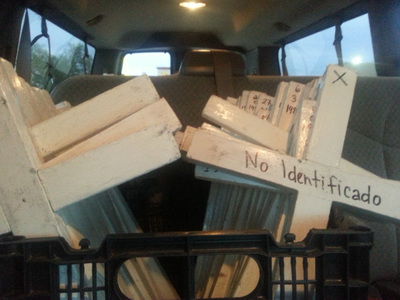
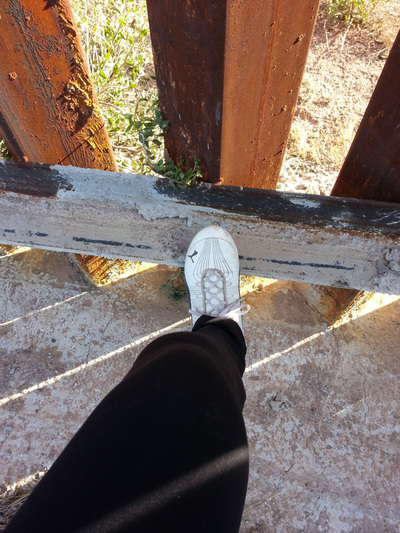
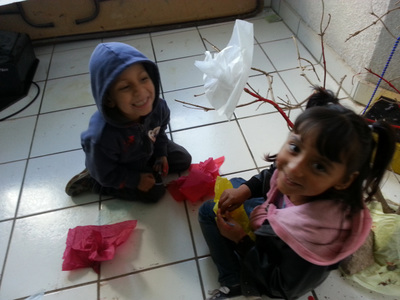
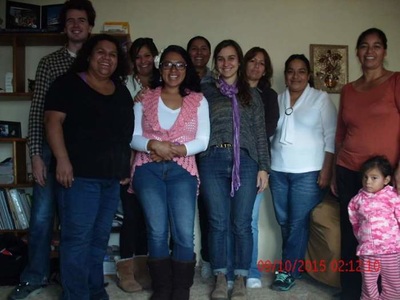
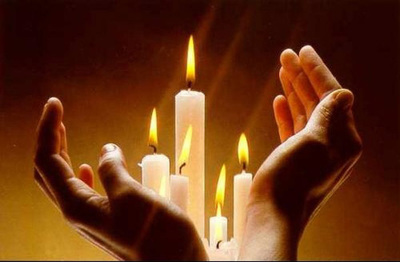
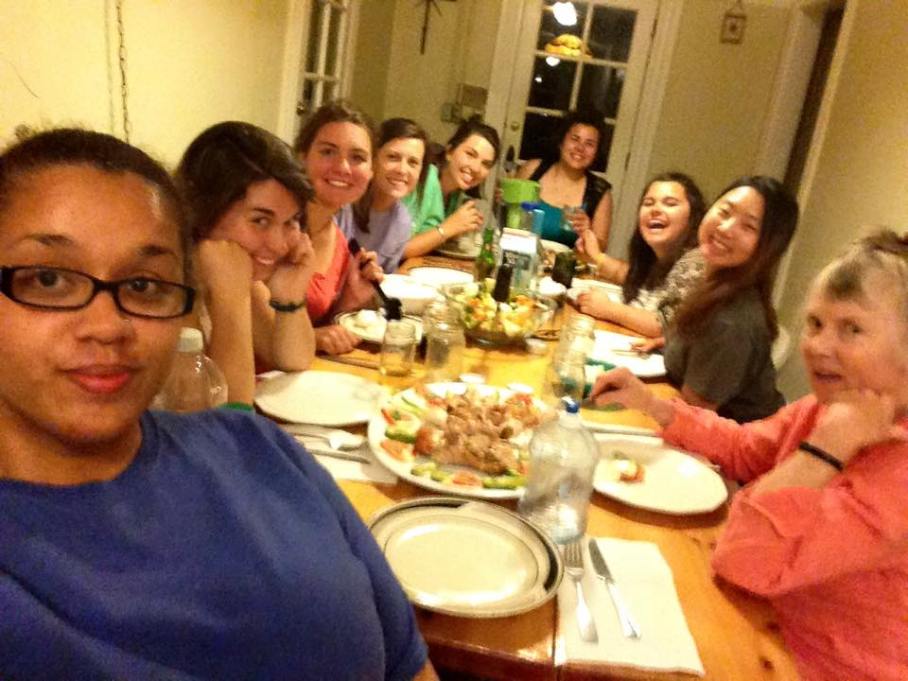
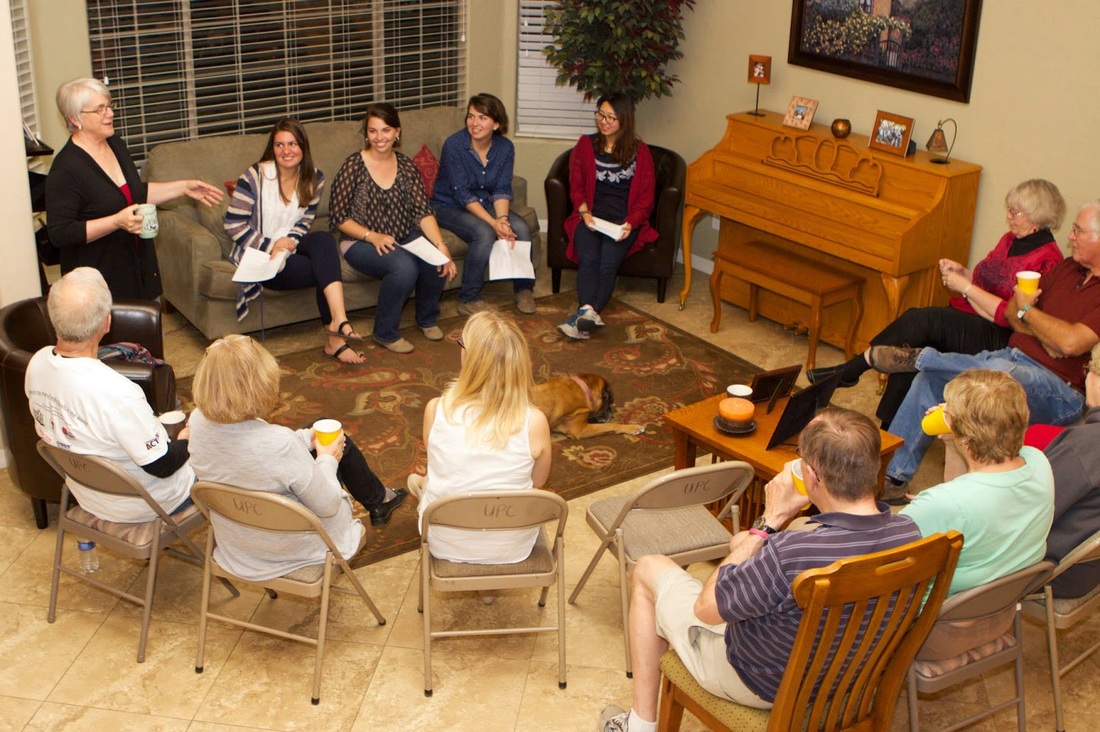
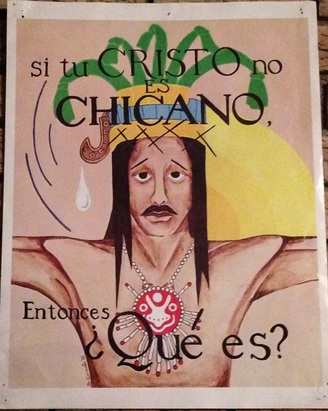
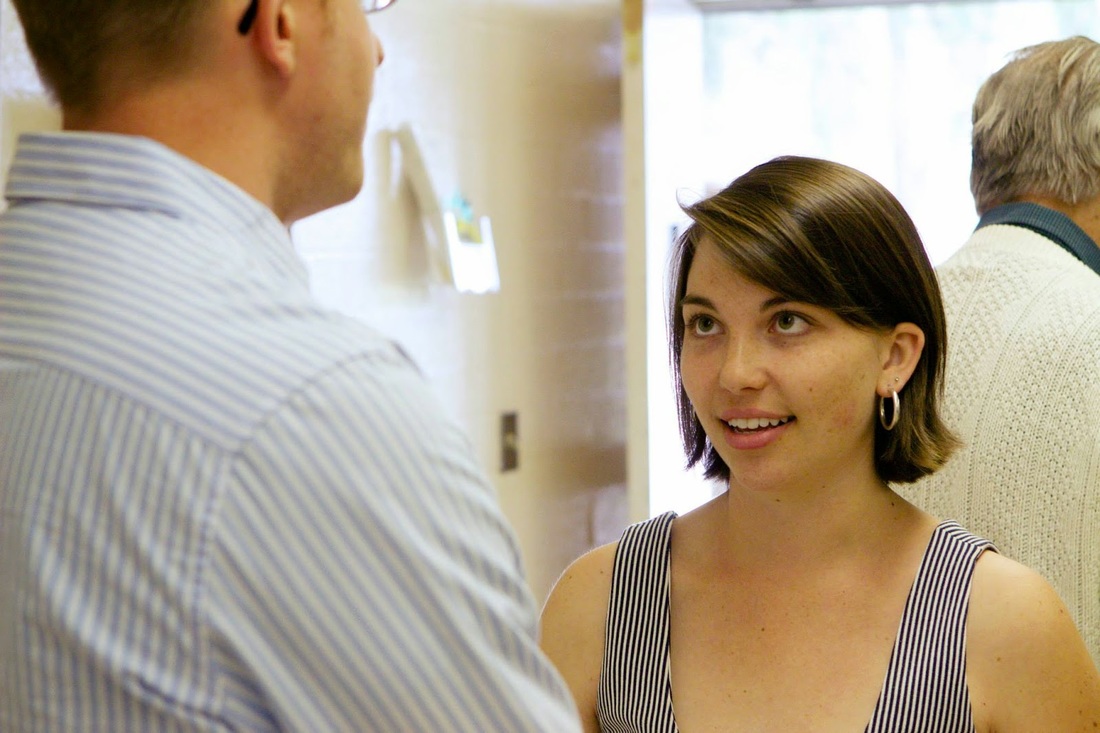
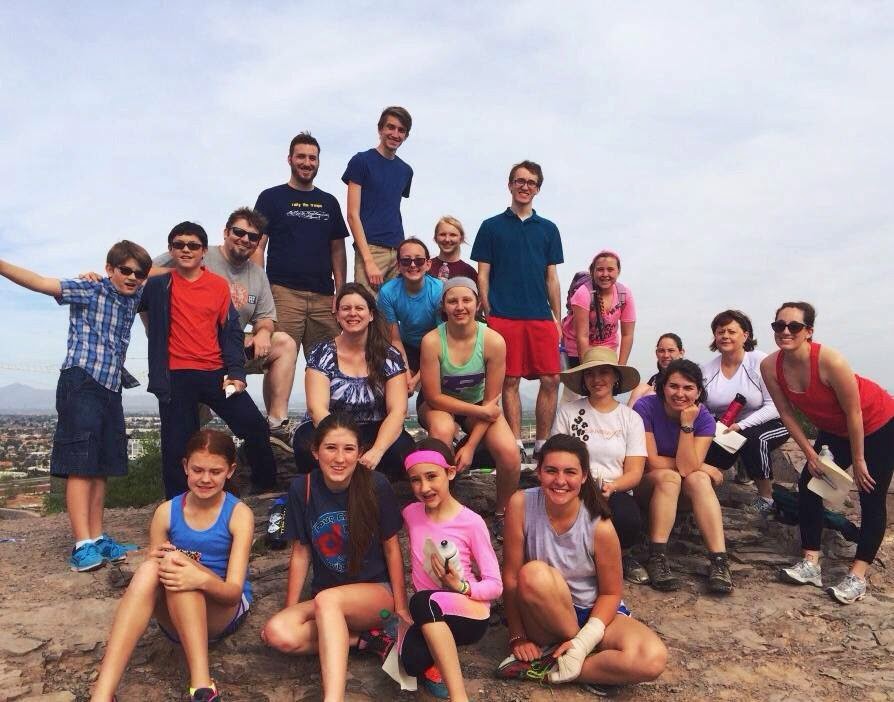
 RSS Feed
RSS Feed
